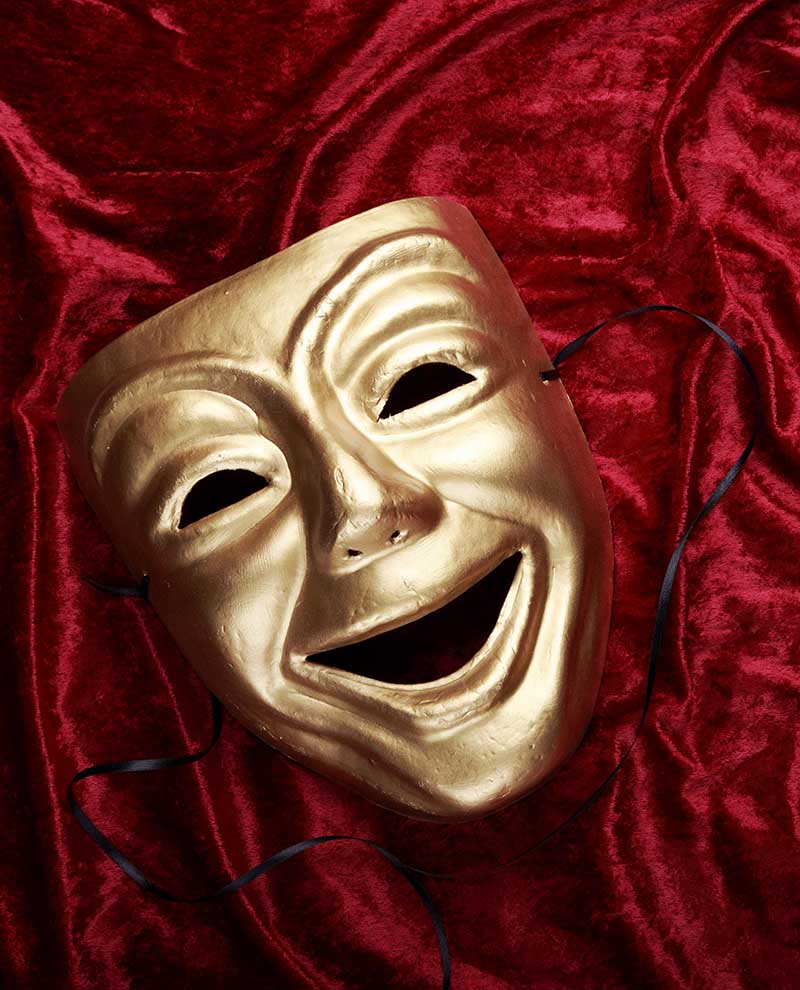 Every year publications like the Rolling Stone magazine and other such magazines come out with top 100 lists that spark debates among pop culture enthusiasts. Although such lists are subjective, things like originality, presence, peak, consistency, legacy and cultural impact are big drivers behind where someone may land. Ranking the best comedians, at least compared to other professions like musicians and actors, is different—much easier—because of the different environment settings and mediums that exist for delivering comedy like television, scriptwriting, podcasting and live shows.
Every year publications like the Rolling Stone magazine and other such magazines come out with top 100 lists that spark debates among pop culture enthusiasts. Although such lists are subjective, things like originality, presence, peak, consistency, legacy and cultural impact are big drivers behind where someone may land. Ranking the best comedians, at least compared to other professions like musicians and actors, is different—much easier—because of the different environment settings and mediums that exist for delivering comedy like television, scriptwriting, podcasting and live shows.
Those considered to be the “best comedians” have a wide range of abilities that have allowed them to experience success across different environment settings and multiple mediums, and it is the defining characteristic of those who are a notch above everyone else. Still, one of the most overlooked pieces when it comes to ranking the best comedians has to do with their origin story, lives full of randomness that gave rise to their “funniness”. Here is a quick look at just how random some of the, from my view, best comedians’ lives have been in the talk show space (Conan O’Brien), scriptwriting (Larry David), podcasting (Andrew Schulz and Akaash Singh), stand-up (Kevin Hart), and on-the-spot (Katt Williams), and excluding Dave Chapelle.
Talk Show – Conan O’Brien
As is the case with most comedians, Conan O’Brien is quite smart, but not all comedians get to attend Harvard, which is where he got his start. At Harvard, Conan joined the famous satirical magazine, Harvard Lampoon, a magazine that helped launch the careers of several prominent comedians and writers. A few years after graduating from Harvard, Conan found himself in Los Angeles and working as a writer, eventually landing a job as a writer for Saturday Night Live. Then Conan transitioned to a writing and producing role with The Simpsons. During Conan’s time at The Simpsons, a period where The Simpsons were recognized as having assembled the greatest group of comedic writers of all-time, he was described by his peers as having unmatched brilliance and as being a few notches above his peers.
After making his name in the writing scene, Conan began to receive inquiries as to whether he would be interested in transitioning into the talk show space, but he would get passed over for David Letterman’s replacement. Conan eventually started an on-camera role as a talk show host with NBC. The early days of Conan hosting his late-night show were complicated by his awkwardness and unconventional humor, something that the late-night audience at the time did not seem to resonate with. After figuring things out (and almost getting fired by NBC), Conan would go on to host Late Night for 16 years. When Conan eventually took over The Tonight Show, an issue arose when Jay Leno’s primetime ratings were underperforming, and NBC attempted to move Conan from his timeslot. He decided to part ways with NBC after only 7 months as the host of The Tonight Show, moving to TBS and hosting Conan for the next decade.
What makes Conan so unique compared to his peers is his orangey hair and his constant “resting face”, which makes him impossible to read. As a host, Conan demonstrated an uncanny ability to “carry” his guests that allowed for even the most reserved guests to shine. Practically all of Conan’s material is miss-free and his awkwardness and ability for self-deprecation has allowed him to find success wherever he goes, which is what makes him a great case study for comedy.
Scriptwriting – Larry David
After finishing college Larry David decided to join the U.S. Army, while also taking up random jobs like being a limousine drive, a clerk at a law firm and even as a bra salesman prior to his big break into comedy. Unlike many comedic greats, Larry was quite awkward, socially anxious, and his jokes were unpredictable. These challenges caused Larry to struggle with stand-up audiences, and he sometimes would walk off stage mid-performance when things went bad. Although Larry’s early comedy style did not make for great stand up, it made for great skits, and he got his scriptwriting start with Fridays and Saturday Night Live. However, Larry was regularly passed over when it came to his “ideas” because of how eccentric he was, and was considered niche until he and Jerry Seinfeld co-created Seinfeld, one of the greatest TV shows of all time.
What made Seinfeld so great was that it was largely based on real-life situations that Larry and his group of comedian friends would go through or hear about, living in New York. However, it was Larry’s ability to put thought to word and make it flow that was perfectly suited for television. The Seinfeld character, George Costanza, was largely influenced by Larry’s real-life personality and behaviors, and it made George one of the most loved characters on TV. After Seinfeld, Larry cemented his scriptwriting legacy with Curb Your Enthusiasm, somewhat of a semi-improvised comedy show where he plays himself. Something about Larry’s social awkwardness and low patience created comedic gold.
What makes Larry’s scriptwriting ability a notch above his peers stems from how he delivers his observational humor. No other scriptwriter has been able to lead and deliver over two decades worth of comedic absurdities and accurately detail human behavior, social missteps, and neurotic reactions that has connected with viewers across all age groups.
Podcasting – Andrew Schulz and Akaash Singh
Growing up in one of the world’s biggest cities and surrounded by the cultures of the world provided Andrew Schulz with a glimpse into how different groups experienced life in New York City. Before getting into comedy, Andrew was studying at UC Santa Barbara until he dropped out because comedy resonated with him more than the traditional schooling route. What makes Andrew’s breakthrough so unconventional is that he was the first comedian to successfully bypass the traditional mediums for comedy in favor of social media platforms and self-promotion and be able to equal mainstream levels of success.
Over a short period of time, Andrew’s jokes began to flood social media platforms and go viral, resonating with the younger audiences who were the most active over social platforms. When it came to stand-up, Andrew earned a reputation for being among the best at having unscripted interactions with audience members, exchanges that regularly went viral. Eventually, Andrew decided to team up with another comedian, Akaash Singh, to co-host the podcast, Flagrant, a first-of-its-kind approach to podcasting that gave rise to comedic-styled interviews.
The co-host of Flagrant, Akaash Singh, grew up in the conservative south and as one of a handful of Indian-American families in that community. Those early experiences helped shape his unique approach to making fun of cultural differences and stereotypes. Like his co-host, Akaash had been studying at the University of Texas before deciding to drop out and pursue a career in comedy, then moving to New York City. Much of Akaash’s early career was plagued by rejections and losing gigs, but after consistent work on MTV shows like Wild ‘N Out, he decided that stand-up and unscripted interactions with audience members was what he excelled at most.
Together, Andrew and Akaash continue to push the boundaries on what is acceptable, a mix of cultural commentary and social issues, recently interviewing former US President Donald Trump in a less-than-serious interview. Both Andrew and Akaash have become known for a rather new skillset, blending interviewing with comedy, and an ability to make the right joke at the right time. Their podcast, Flagrant, has introduced an alternative style of interview that has helped to show never-before-seen sides to people, and it has created a space for other comedians to experience success by following their blueprint. As a result, some of the most popular podcasts are now those that follow Flagrant’s comedy-styled approach to interviewing, a long form style of interview that promises laughs, something that was once unimaginable.
On-the-spot – Katt Williams
Challenging conditions, tough environments, and the different people Katt Williams came across throughout his life are what shaped his comedic perspective. Family dynamics and at-home turbulence during Katt’s development years resulted in him leaving home at an early age, a family he described as being highly educated. During his time away from home, there were points where he was living with Jehovah’s Witnesses to avoid being homeless and how he was forced to attend their church services and kept his comedy aspirations secret from them. Katt would end up moving around from city to city, taking odd jobs and even engaging in some less-than-legal side hustles, before returning to Ohio and performing stand-up at different clubs.
What makes Katt so unique largely stems from his one-of-a-kind image, his ability to detail the absurdities of life and to captivate audiences with his on-stage presence ended up catching the eye of Dave Chappelle. From there, Katt made his way to television and cinema and received his own comedy specials, but his greatest ability may be his on-the-spot thinking. One of the worst ideas may be to try to embarrass a comedian or getting into a heated argument with one over live radio, which is what one radio host in Atlanta decided to do with Katt. However, that host found out just how bad that idea was after she decided to question Katt’s sexuality (who is straight), speak about his children (including his adopted children), and even call him a substance abuser and felon.
After trying to avoid a dissing contest and attempting to talk about what had been planned, Katt decided to roll up his sleeves and engage with the radio host. After the host called Katt a “lil mama”, what resulted is one of the funniest roast sessions to ever transpire on live radio, but his jokes almost got him killed. By the end of the exchange, the host was on the receiving end of all the laughs, her co-hosts were crying from laughing at the jokes Katt directed at her. However, it was host’s husband who was most offended by them, he tracked down Katt at a comedy club and threatened him with a gun. Thankfully for radio host and her husband, Katt chose not to press charges against them and has described the entire situation as an unnecessary sequence of events that could have been avoided had the radio host not chosen to attempt to embarrass him.
Stand-up – Kevin Hart
One of the world’s most recognizable and likeable personalities, Kevin Hart, may have had one of the wildest paths before making it big. Whether it was having a father who struggled with addiction and once arrived at Kevin’s school under the influence of substances wearing only a bathrobe or surviving rough neighborhoods in Philadelphia, Kevin has managed to find humour in all of it. Like many comedians, Kevin has credited his random jobs for providing him with bizarre interactions and eccentric personalities encountered on the job that have served him well with comedy. However, most of Kevin’s earliest attempts at stand-up were rather unsuccessful, and one occasion someone from the audience threw a chicken wing that ended up hitting him.
Despite the Kevin’s early struggles with his comedic pursuits, those challenges pale in comparison to some of the challenges that he had faced at other jobs, which have made for some great stand-up. As a shoe salesman, Kevin got into a dispute with a customer who turned out to be a drug dealer and who he agreed to fight after his shift (Kevin lost). Kevin has also credited some of that toughness stemming from moments that he shared with his older brother, who once staged a fake robbery to “toughen Kevin up”, which resulted in Kevin traumatized and running for help and not fighting back.
What makes Kevin stand out among his peers when it comes to stand-up comedy is his high-energy stage presence and storytelling ability, authentic and relatable accounts of his life and self-deprecating to the extremes. Many of Kevin’s jokes revolve around his most embarrassing moments and lapses in judgement, then genuinely laughing at himself and with the audience. Many who have seen Kevin perform live have described him as having unmatchable enthusiasm and charisma, and it is why many have called one of the most likeable comedians.
The “recipe” for what it takes.
Authenticity, quick wit, resilience, self-deprecation, relatability, storytelling ability, audience engagement, charm, and fearlessness: these are just some of the things that most of the comedians mentioned above have in common, but that the likes of Conan, Larry, Andrew, Akaash, Katt, and Kevin all seem to have an excess of. As is the case with every career path, there was nothing innate about those comedians, all of them worked hard to get to where they are, and most of them would describe themselves as having been “class clowns”. Perhaps a future thesis could be that “class clowns are among the 99th percentile for intelligence, but they also happen to be in the 99th percentile when it comes to having the discipline to excel in academia”.


